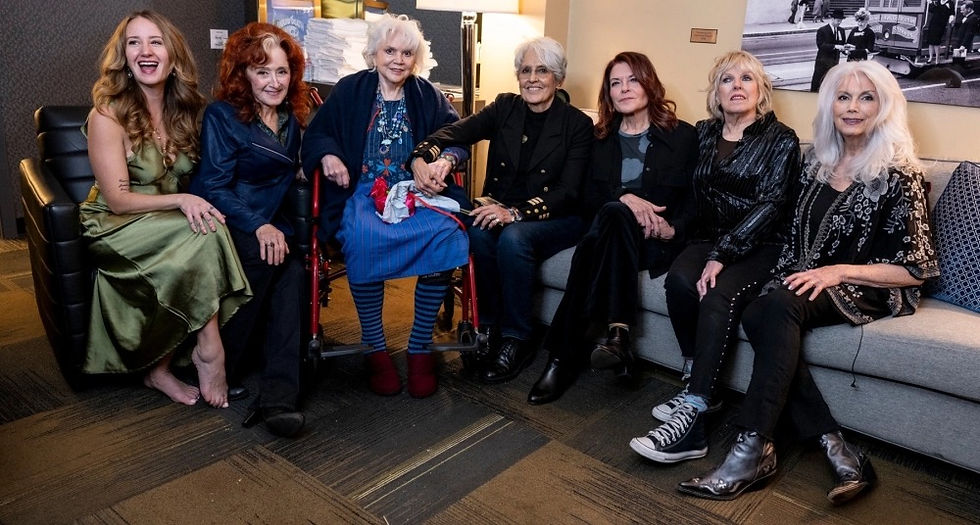Overdue Tribute to Folk Legend
- cutlercomms
- Dec 16, 2024
- 4 min read
Updated: Dec 24, 2024

If anything best defined dying as unjust, it would be that the circumstances of your death overshadowed your achievements in life! And that’s exactly what happened to acclaimed Americana pioneer David Olney who suffered a heart attack midway through a song while performing at Santa Rosa Beach, Florida, in early 2020.
The headlines at the time of his death – on January 18 - all had a similar theme: “David Olney, 71, Singer-Songwriter, Dies Onstage” (N.Y. Times); “A singer-songwriter apologized, closed his eyes, dropped his head and died onstage” (Washington Post); “Nashville folk singer David Olney ‘apologises to the crowd’ before dying on stage” (Sky News).
The coverage was centred on a Facebook posting by singer-songwriter Scott Miller who was performing with Olney at the time: "David was playing a song when he paused, said ‘I’m sorry’ and put his chin to his chest,” Miller wrote. “He never dropped his guitar or fell off his stool. It was as easy and gentle as he was.”
So, it was not until all these sad facts of his passing were detailed by the media before the talent of David Olney finally emerged. During a career spanning 50 years, he released around two dozen albums, the last in 2018. But it was as a songwriter that won him the most respect within the music industry and many big names have recorded his compositions, including Linda Ronstadt, Emmylou Harris, Steve Earle, Tim O’Brien and Del McCoury.
And he was no better honoured than in the liner notes to Roses, his third album, where one of the great musical poets Townes Van Zandt wrote: “Anytime anyone asks me who my favorite music writers are, I say Mozart, Lightnin’ Hopkins, Bob Dylan and Dave Olney. Dave Olney is one of the best songwriters I’ve ever heard – and that’s true. I mean that from my heart.”
And though sadly no longer around, Townes gets a listing – along with some of the biggest names in Americana music – in a long-awaited tribute album, Can’t Steal My Fire: The Songs of David Olney, released in late October, almost five years after his much-publicised death. The list of contributors only enhances Olney’s reputation as “a songwriter’s songwriter.” They include some of the best who have also put a pen to a music sheet. Besides Van Zandt, there is Earle, Lucinda Williams, Jimmie Dale Gilmore, Mary Gauthier, Dave Alvin and Jim Lauderdale.
Williams fittingly opens the tribute album with her trademark, rock-infused treatment of “Deeper Well,” probably Olney’s most popular composition and the title track to his 1989 album. The song has a curious backstory. In 1995 Emmylou Harris included it in her career-defining, Grammy-winning album Wrecking Ball. On the album sleeve, Harris and producer Daniel Lanois get a co-writer’s credit, along with Olney. And this raised eyebrows among the purists who saw little difference from Olney’s acoustic original.
“If It Wasn’t for the Wind” must be one of Olney’s most beautiful songs and certainly a poetical inspiration. And who better to deliver a tribute version than Jimmie Dale Gilmore, an artist with a one-in-a-million voice. Gilmore’s interpretation is a little less sparse than Olney’s original back in 1986 but the Texan maintains a similar distinctive melodic delivery as he pines:
Water is gold in the desert sand
Time is precious to a dying man
To a dying man afraid and alone
Love is like gold in his heart of stone
Earle has always been a big fan of Olney and was an obvious choice to participate in the tribute collection, as was his selection, the endearing “Sister Angelina,” It has long been on his setlist and his soothing version is wonderfully respectful, almost pious.
In the liner notes to Can’t Steal My Fire, Earle expanded on his admiration for the song:
“I’ve played it literally hundreds of times .. and I’ll continue to play it whenever I need to be reminded of where I come from as an artist and why the bar for my contemporaries and myself is so high. Because David Olney was the best of us.”
It seems only appropriate that Olney’s most intriguing song “1917,” which examines the futility of war through the eyes of a French prostitute, is afforded to Mary Gauthier. For perhaps Gauthier’s finest album, Rifles and Rosary Beads,” was co-written with military veterans after she’d been invited to participate in a program labelled “Songwriting With: Soldiers.” On “1917,” she delivers Olney’s first-person lyrics as though they are her own:
He speaks to me in schoolboy French
Of a soldier’s life inside a trench
The look of death, the ghastly stench
I do my best to please him
The album ends with something of an historical masterpiece – a never-before-released live recording of Van Zandt performing “Illegal Cargo.” It was recorded at the Cat’s Cradle in Chapel Hill, N.C. on March 11,1977. And, along with “If My Eyes Were Blind” by the Steeldrivers, it was released as a single. If Townes were alive today, he would no doubt be humbled that “Illegal Cargo” has been mined from the archives for such a tribute.
And, in case you’re wondering, Olney himself gets a listing, with his live recital of his witty, welcome-to-hell “Sonnet #40.” And, like Townes, this is a first-time release!
What makes Can’t Steal My Fire: The Songs of David Olney so appealing is that each artist sticks to their knitting - whether it be Lucinda’s raunchy rendition of “Deeper Well”; the McCrary Sisters putting their unique gospel harmonies to “Voices on the Water”; Afton Wolfe doing a rock-until-you-drop version of “Titanic”; or Buddy Miller being, well just Buddy Miller, and not wanting to upstage Olney on “Jerusalem Tomorrow,” his delightful tale of a religious charlatan.
The album sends an almost evangelical message to Olney that he certainly has nothing to be sorry about – and that includes failing to finish his final song!
Paul Cutler
Editor Crossroads – Americana Music Appreciation





Comments